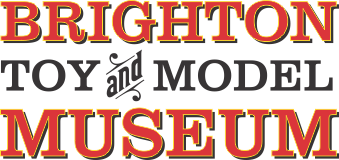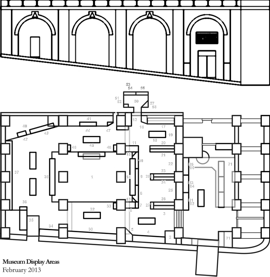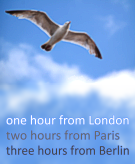Category:Preston Manor
1935: Preston Old Church and Manor [image info]
~1961: "PRESTON MANOR (Preston Park) – the beautifully furnished Georgian Manor House now open to the public." [image info]
2017: Preston Manor and Old Church [image info]
1935: Preston Old Church, seen from the Walled Gardens [image info]
Preston Manor (Now styled Preston Manor and Gardens) is a grade II*-listed manor house mostly built in 1738, and restyled in 1905. It is preserved, owned by Brighton & Hove Council and run as a museum of Edwardian life and social history. The manor-house is usually open to the public six months of the year during the more summery months (2018 opening is April to September inclusive). It is part of the Brighton Heritage Learning group.
History
Preston was listed as a Manor in the 1086 Domesday Book, and should therefore have had a manor building of some sort, somewhere, by this point. Some sort of building on the Preston Manor site has existed at least as far back as the Thirteenth Century, with the Elrington family leasing the land at least as far back as the Sixteenth Century. The Shirley family then took ownership in 1569, the Western family took over in 1712, and in 1794, William Stanford bought it, along with around a thousand acres of land.
The area began to be developed in the late Nineteenth Century, and although the Stanfords sold the main adjacent Manor grounds (around 67 acres) to Brighton Corporation in 1883 for the creation of Preston Park, they kept the Manor buildings and the Walled Gardens until late 1932, when Charles Thomas-Stanford's widow Ellen died.
At this point the Corporation took over the remains of the estate, with the Walled Gardens effectively becoming part of the adjacent Preston Park.
Preston Manor was then opened to the pubic in 1933.
1933 description:
Preston Manor-House
Preston Park was formerly part of the Manor of Preston, which extends as far as Crawley. The Manor-House is built on the foundations of a Tudor structure, which was one of several residences given by Henry VIII to Anne of Cleves, the wife whom he divorced because of her want of good looks. Behind several of the firegrates are curiously wide spaces, designed as hiding-places. Some large cellars suggest that in its day the dwelling had a share in the smuggling once rife in Sussex. So ancient a house, of course, had its ghost, traditionally said to have been that of a nun denied proper burial. It is declared that during drainage operations the bones of a woman were unearthed in the garden, and when these were transferred to the neighbouring churchyard the perturbed spirit found rest.
— , -, , A Pictorial and Descriptive Guide to Brighton and Hove, 10th Edition, , Ward, Locke & Co Ltd., , 1933
@2017: Information board text:
Preston Manor
A delightful manor house capturing the atmosphere of an Edwardian home both "upstairs and downstairs". Visitors can take a step back in time exploring over 20 rooms on four floors from the superbly renovated servants quarters in the basement to the attic bedrooms on the top floor.
An admission is payable and opening times are available from the Manor.
— , Brighton & Hove Council, , Preston Park Information Board, , -2017
Other structures
- The Church of St. Peter, Preston dates from the very late Thirteenth Century, although a church is listed as present on the site (probably on at the same location) in the 1086 census. The church interior had to be restored after a bad fire in 1906.
- Just to the North of the Church is a horse-operated well (which supplied water for the Manorhouse), and a building that might include the stabling for the horse. It seems that this is being allowed to fall into disrepair.
Addresses
- Preston Manor, Preston Drove, Brighton BN1 6SD
External links
- Parishes: Preston (british-history.ac.uk)
- "Historic England" listing, #1000204 Preston Park (historicengland.org.uk)
- Preston Manor (culture24.org.uk)
- Preston Manor, Brighton (wikipedia.org)
Pages in category ‘Preston Manor’
This category contains only the following page.
Media in category ‘Preston Manor’
The following 10 files are in this category, out of 10 total.
- Glimpse of Preston Manor Gardens (BrightonHbk 1935).jpg 2,147 × 3,000; 4.88 MB
- Heritage Learning Brighton and Hove.jpg 142 × 120; 9 KB
- Laburnum tunnel, Walled Garden, Preston Park, 01 (Brighton 2017).jpg 3,000 × 2,000; 3.08 MB
- Laburnum tunnel, Walled Garden, Preston Park, 02 (Brighton 2017).jpg 3,000 × 2,000; 4.79 MB
- Preston Manor (BHOG ~1961).jpg 2,500 × 1,396; 2.15 MB
- Preston Manor and Old Church (Brighton 2017).jpg 3,000 × 1,691; 2.44 MB
- Preston Old Church and Manor (BrightonHbk 1935).jpg 3,000 × 1,154; 2.37 MB
- Preston Old Church, lineart, Arthur Watts (BrightonHbk 1935).jpg 1,696 × 2,200; 1.57 MB
- Walled Garden, Preston Park, 03 (Brighton 2017).jpg 3,000 × 2,000; 3.23 MB
- Walled Garden, Preston Park, 04 (Brighton 2017).jpg 3,000 × 2,000; 3.9 MB















